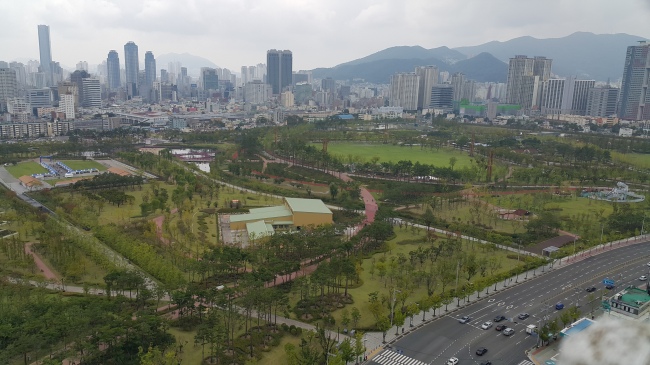Urban forests have played a key role in improving the quality of life for those living in metropolitan cities by tackling urban heat island effects and fine dust in South Korea, where more than 90 percent of its population reside in cities.
Forests in Korea help decrease the amount of fine particles by more than 1 million tons per year, according to the Korea Forest Service. But the capital city Seoul, home to nearly one out of five people living here, is suffering from a shortage of urban forests.
Seoul had 5.35 square meters of green space per capita as of the end of 2015, falling far short of the minimum standard of 9 square meters by the World Health Organization.
The KFS has two main issues to tackle: The health problem Koreans may suffer from due to inhalable matters, and bringing the amount of green space up to WHO standards.
Forests in Korea help decrease the amount of fine particles by more than 1 million tons per year, according to the Korea Forest Service. But the capital city Seoul, home to nearly one out of five people living here, is suffering from a shortage of urban forests.
Seoul had 5.35 square meters of green space per capita as of the end of 2015, falling far short of the minimum standard of 9 square meters by the World Health Organization.
The KFS has two main issues to tackle: The health problem Koreans may suffer from due to inhalable matters, and bringing the amount of green space up to WHO standards.

The KFS has emphasized the importance of urban forests which collect ultrafine dust since the temperature in the forest is low and humidity is high.
A recent study showed that this year in spring -- when the Korean Peninsula is known to be the most susceptible to the incoming fine dust crossing Yellow Sea -- Hongneung Forest in eastern Seoul contributed to the significant drop in inhalable particulate matters within a 2 kilometer radius from its core.
In the core of forest covering 35.3 hectares of Dongdaemun-gu district, the volume of inhalable particles with a diameter ranging from 2.5 micrometers to 10 micrometers was lower by 25.6 percent than in cities, while that of the particles with diameter less than 2.5 micrometers -- also known as ultrafine dust -- was lower by 40.9 percent, for about three weeks on average from April 17 to May 4.
Since Kim Jae-hyun took office as KFS minister in July, many cities across the nation including Gunsan, Suwon, Ulsan and Pyeongtaek have rolled out plans to build additional urban forests in or nearby the towns.
Alongside the move, the KFS reached out to the private sector and recruited Kim Ju-yeol, formerly at Samsung C&T, to oversee the urban forest-building policies.
Meanwhile, a Korean lawmaker called for stronger measures to keep urban forests more effective in fighting fine dust. Rep. Kim Cheol-min of the ruling Democratic Party said Monday a new urban project should include plans to designate a certain portion of the new city to forests.
By Son Ji-hyoung
(consnow@heraldcorp.com)
A recent study showed that this year in spring -- when the Korean Peninsula is known to be the most susceptible to the incoming fine dust crossing Yellow Sea -- Hongneung Forest in eastern Seoul contributed to the significant drop in inhalable particulate matters within a 2 kilometer radius from its core.
In the core of forest covering 35.3 hectares of Dongdaemun-gu district, the volume of inhalable particles with a diameter ranging from 2.5 micrometers to 10 micrometers was lower by 25.6 percent than in cities, while that of the particles with diameter less than 2.5 micrometers -- also known as ultrafine dust -- was lower by 40.9 percent, for about three weeks on average from April 17 to May 4.
Since Kim Jae-hyun took office as KFS minister in July, many cities across the nation including Gunsan, Suwon, Ulsan and Pyeongtaek have rolled out plans to build additional urban forests in or nearby the towns.
Alongside the move, the KFS reached out to the private sector and recruited Kim Ju-yeol, formerly at Samsung C&T, to oversee the urban forest-building policies.
Meanwhile, a Korean lawmaker called for stronger measures to keep urban forests more effective in fighting fine dust. Rep. Kim Cheol-min of the ruling Democratic Party said Monday a new urban project should include plans to designate a certain portion of the new city to forests.
By Son Ji-hyoung
(consnow@heraldcorp.com)








![[Graphic News] More Koreans say they plan long-distance trips this year](http://res.heraldm.com/phpwas/restmb_idxmake.php?idx=644&simg=/content/image/2024/04/17/20240417050828_0.gif&u=)
![[KH Explains] Hyundai's full hybrid edge to pay off amid slow transition to pure EVs](http://res.heraldm.com/phpwas/restmb_idxmake.php?idx=644&simg=/content/image/2024/04/18/20240418050645_0.jpg&u=20240419100350)






![[From the Scene] Monks, Buddhists hail return of remains of Buddhas](http://res.heraldm.com/phpwas/restmb_idxmake.php?idx=652&simg=/content/image/2024/04/19/20240419050617_0.jpg&u=20240419175937)

![[KH Explains] Hyundai's full hybrid edge to pay off amid slow transition to pure EVs](http://res.heraldm.com/phpwas/restmb_idxmake.php?idx=652&simg=/content/image/2024/04/18/20240418050645_0.jpg&u=20240419100350)

![[Today’s K-pop] Illit drops debut single remix](http://res.heraldm.com/phpwas/restmb_idxmake.php?idx=642&simg=/content/image/2024/04/19/20240419050612_0.jpg&u=)